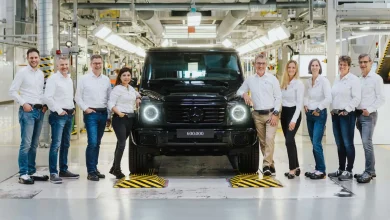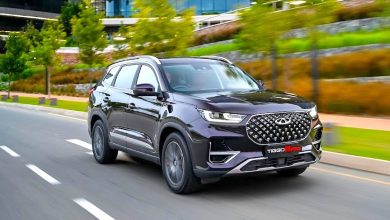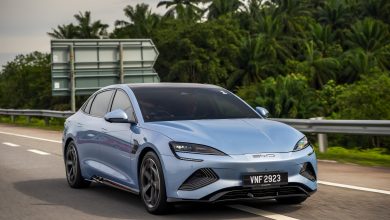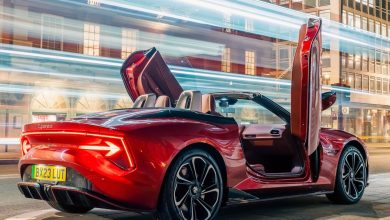Renault F1 இன் எதிர்காலம் என்னவென்பதைக் காட்டுகிறது

ஃபார்முலா 1 இன் 40 ஆண்டு அனுபவத்தால் உதவியது, ரெனோல்ட் 2027 ஆம் ஆண்டில் பந்தயத்தின் பிரதான தொடர் என்னவாக இருக்கும் என்பதை ஒரு பார்வை கோடிட்டுக் காட்டுகிறது:
விளையாட்டின் இதயத்தில் ஓட்டுனருடன் ஒரு மனித-மையமான சாம்பியன்ஷிப், ஒரு வெளிப்படையான காக்பிட் மற்றும் ஒரு வெளிப்படையான ஹெல்மெட் எடுத்துக்காட்டுகிறது, இது இயக்கத்தின் வெப்பத்தில் பார்க்க அனுமதிக்கப்படுகிறது.
சுழற்சிக்கான சுறுசுறுப்பான எல்.ஈ. லைட்டிங் மூலம், காரின் செயலில் இறக்கைகள் போன்ற ஏரோடைனமிக் பாகங்கள் நகரும்.
ஒரு விபத்து வழக்கில் செயல்படுத்தப்படக்கூடிய ஒரு தன்னாட்சி பயன்முறையில் நன்றி பாதுகாப்பான பந்தயத்தில், ஒரு தீவிர எதிர்ப்பு பாலிகார்பனேட் காக்பிட் விதானம் இணைந்து தாக்கம் எதிராக பாதுகாக்க.
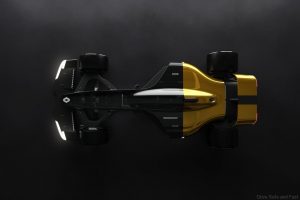
கார்கள் மற்றும் அதிக பார்வையுடன் பார்வையாளர்களுடன் அதிக விரிவான ஒருங்கிணைப்பு. ரசிகர்கள் தங்களுக்கு பிடித்த டிரைவர் டெலிமெட்ரி தரவை உதாரணமாக பார்க்க முடியும்.
நான்கு சக்கர டிரைவ், நான்கு சக்கர திசைமாற்றி மற்றும் மிக உயர்ந்த ஆற்றல் அடர்த்தி மின்கலங்களில் உள்ள Groupe Renault இன் நிபுணத்துவத்திலிருந்து நன்மை பெறும் அல்ட்ரா-உயர் செயல்திறன் ஓட்டம்.
ஃபார்முலா 1 இன் இன்னும் கூடுதலான சுற்றுச்சூழல்-மரியாதையான வடிவம், எரிபொருள் தொட்டி திறன் 10 ஆண்டுகளுக்கு இடைவெளியில், மேலும் குழாய் பாதை வழியாக முழு மின்முனையையும் பயன்படுத்துகிறது.
தி ஆர். 2027 விஷன் கூட C- வடிவ லேசிங் கையொப்பத்தைக் கொண்டுள்ளது, இது ரெனால்ட்டின் சாலை வாகனங்களின் ஒரு பிரபலமான அடையாளமாக உள்ளது.
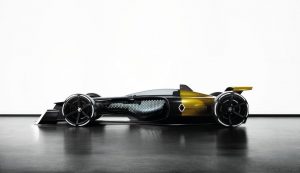
“ரெனால்ட் ஸ்போர்ட்ஸ் ரேசிங் ஒரு பாத்திரம் ஃபார்முலா 1 இன் எதிர்காலத்தை எதிர்பார்க்கிறது, இது பெருமளவிலான ரசிகர்களை பெருமளவில் Groupe Renault இன் குறிக்கோள்களுடன் ஒரு சூழலில் ஈர்க்கிறது. ரேசிங் சமுதாயத்துடன் ரசிகர்கள் மற்றும் ஆர்வலர்கள் ஆகியோருடன் ஊக்கமளிக்கும் உரையாடல்களை உருவாக்குவதற்கு நாங்கள் எதிர்நோக்குகிறோம். எங்கள் சிந்தனைகளையும் விருப்பங்களையும் சிறப்பித்துக் காட்டுகிறோம் “என்று ரிலையன்ஸ் ஸ்போர்ட்ஸ் ரேசிங் நிர்வாக இயக்குனர் சிரில் அபெட்போல் தெரிவித்தார்.

